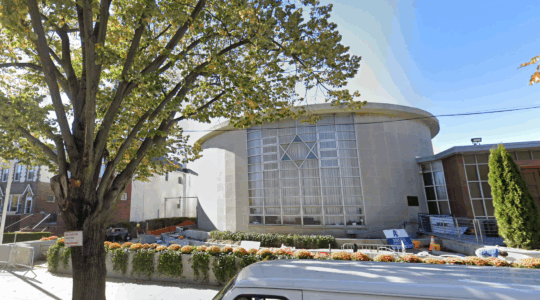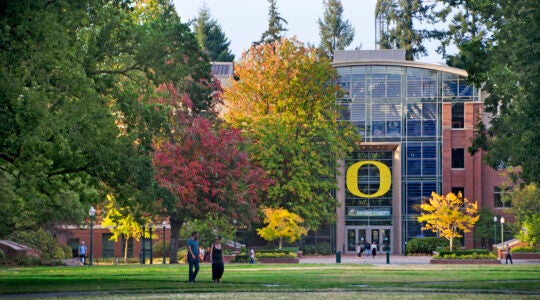Shuly Rubin Schwartz, the chancellor of the Jewish Theological Seminary, is stepping down next year after leading the Conservative movement’s flagship university and rabbinical seminary since 2020.
Schwartz announced her decision at a meeting of the JTS board of trustees Monday morning. In an interview with the Jewish Telegraphic Agency, Schwartz, the first woman chancellor in the institution’s history, said she planned when she was appointed “that I would not be there for a lengthy tenure.
“I’ve been here for 34 years,” said Schwartz, a professor of Jewish history at JTS who previously served as dean of its Albert A. List College of Jewish Studies, dean of the Gershon Kekst Graduate School and as provost. “After a sabbatical, I will go back to the faculty, so it is not with anything other than love and excitement about what we’ve been able to achieve and frankly, modeling healthy leadership transition when we’re in a strong place.”
Schwartz will step down at the end of 2025-26 academic year. In a news release, JTS said an executive search firm is helping find the ninth chancellor in the school’s 139-year history.
“Over the course of Chancellor Schwartz’s tenure, JTS has faced a complex and evolving landscape. From the COVID-19 pandemic and the pivot to virtual learning, to rising threats to civil discourse, the tragic events of Oct. 7, increasing antisemitism and pressure on academic institutions – she has led us with clarity, nuance, and compassion,” said Alan Levine, chairman of the board of trustees, in a statement. “Through her exceptional leadership, Chancellor Schwartz has not only guided the institution through these turbulent times but has ensured that it emerges stronger than before.”
Schwartz, who grew up in Wantagh, Long Island, and lives on the Upper West Side, has a lifelong connection to JTS: Her grandfather and her mother, Gilla Pearlstein Rubin, graduated from its Teacher’s Institute; her father Rabbi Mordecai Rubin was ordained at JTS. She was the third non-rabbi to be appointed chancellor, after her predecessor, religion scholar Arnold Eisen, and the scholar Cyrus Adler, who served from 1924-1940.
In an interview, Schwartz, 72, described what she felt were her key accomplishments as chancellor. They included the transition to online learning during the pandemic, a new Division of Lifelong and Professional Studies as well the launch of a creative writing MFA program to be headed by the acclaimed Israeli writer Etgar Keret.
JTS also hired four faculty during her tenure. They include historian Sandra Fox as the inaugural Rifkind Chair in Jewish History, endowed by an influential board member shortly before his death earlier this year.
“Since that is my field, I am thrilled about that, particularly because it is the last hire I made,” Schwartz said.
While JTS offers graduate degrees in Jewish studies and education, and undergraduate degrees through a dual-degree program between List College and Columbia University and Barnard College, it is perhaps best known as the main training ground for Conservative rabbis and cantors.
The non-Orthodox rabbinical and cantorial schools had seen a decline in enrollment in recent years, and Schwartz and Levine both said JTS has been making it a priority to boost the “leadership pipeline” through, among other moves, an “emerging leaders” fellowship and a low-residency preparatory program for prospective rabbis.
This past year JTS ordained nine rabbinical students and three cantorial students, an increase over recent years. In the fall JTS will welcome 17 rabbinical school students and four cantorial school students.
“Not enough young people see themselves as being called to lives of service to the Jewish people,” said Schwartz. “As a people we had lost the art of identifying young talent, and being too timid to say, ‘Have you ever thought about becoming a rabbi?’ We had to rebuild that muscle.”
Schwartz said that despite a shrinking number of pulpits as Conservative congregations contract or merge with other synagogues, “our students are in high demand.” In travels across the country, she said, synagogue leaders often say they are eager to hire JTS-trained rabbis when their own rabbis retire.
According to a Pew Research Center study, as of 2020 17% of American Jews identified as Conservative compared to 37% who identified as Reform. Despite those trends, Schwartz says she has visited “dozens of synagogues over these five years that are flourishing.”
“It seems to be more a crisis of confidence than an actual crisis,” she said
After the COVID epidemic and more recently the trauma of the Oct. 7 attack on Israel, she said, more Jews ”want to find their connection to the Jewish people. And so many of them are drawn to our synagogues and synagogues of other denominations.”
What makes Conservative Judaism appealing in the moment, she said, is its “principled centrism” in a world that has become increasingly polarized. Positioned between Orthodox Judaism and the more liberal Reform and Reconstructionist movements, “we can see the importance of full engagement with the world, and also the importance of tradition and prayer, in Hebrew, and obviously love and connection to Israel.”
Schwartz said JTS remains a Zionist institution at a time when other non-Orthodox seminaries are accommodating non- and anti-Zionist candidates. “That is one of the things that is probed” during the application process, she said.
Schwartz’s decision to step down comes amid other leadership changes at Conservative institutions. In Israel, American-born Rabbi Matt Berkowitz takes over next month as president of The Schechter Institutes, which includes the Jerusalem-based Schechter Rabbinical Seminary. In what Berkowitz described in a statement as a “liminal moment,” he will replace Rabbi David Golinkin, a leading Conservative authority on Jewish legal issues who in his 35 years as head of The Schechter Institutes has occasionally clashed with more liberal-leaning rabbis and institutions, especially over the ordination of LGBT Jews.
The Schechter Institute of Jewish Studies also has a new dean, Sarah Schwartz, a Bible scholar who formerly headed Schechter’s Bible studies department.
Asked about the new leadership and her potential successor at JTS, the outgoing chancellor said the movement needs leaders prepared for the unexpected.
“When I took this job in July of 2020, I had no idea how long COVID would disrupt our lives. None of us anticipated Oct. 7 and the impact that would have,” Schwartz said. “I hope we find someone who understands the complexity of the world that we are living in now and the enormous gifts that JTS brings to the table in helping individuals make meaning.
“All I can say is, we are preparing leaders for the future, which means we have no idea what they are going to confront.”
JTA has documented Jewish history in real-time for over a century. Keep our journalism strong by joining us in supporting independent, award-winning reporting.






